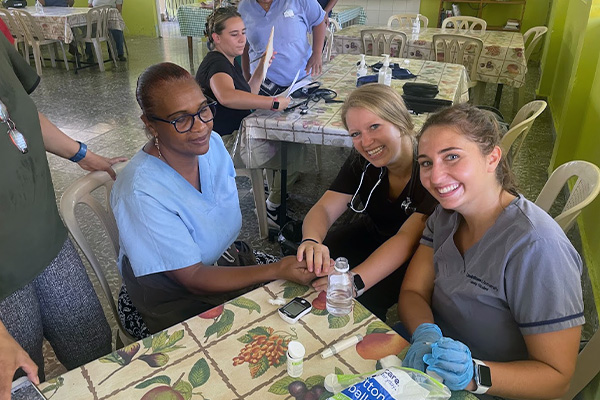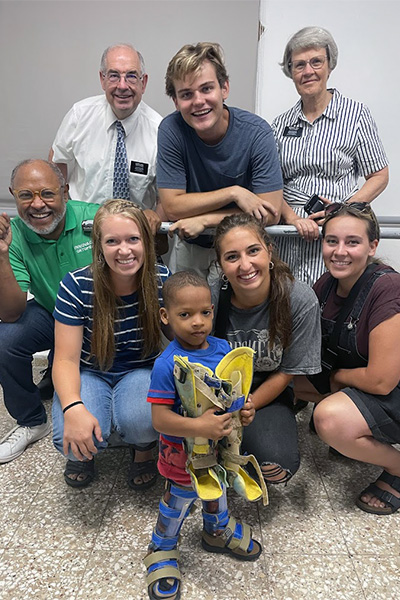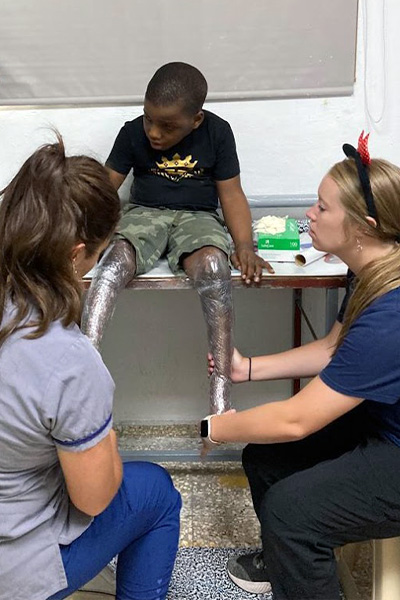Nursing Students Provide Help and Healthcare Worldwide through Huntsman SEED Program

Shalese Evertsen (right) and Alex Bushman (center) teach a patient about managing blood sugar at a
community health clinic in the Dominican Republic.
Five students from the USU Nursing program spent their summer providing health and humanitarian service abroad in a collaboration with the John M. Huntsman School of Business’s Small Enterprise Education and Development (SEED) program.
Nursing department head Carma Miller first learned about the SEED grant program when she met Bret Crane, executive director of the Covey Leadership Center at the Huntsman School of Business, at Day on the Quad last fall. SEED is an internship program that sends students from USU around the world to teach and mentor entrepreneurs in developing countries, helping them break the poverty cycle by providing the knowledge, financial resources, and skills needed to establish and grow small businesses.
Miller immediately began to see connections between the SEED program and the Nursing department; helping communities build resources often enables them to invest in higher levels of education, healthcare, and over well-being for their families and communities, leading to positive, sustainable change.
“We believed that our Nursing students could play a vital role in future SEED visits by contributing their expertise in healthcare,” said Miller. “The integration of healthcare services is essential for enhancing overall well-being, and both components—economic empowerment through SEED initiatives and access to quality healthcare—are integral to achieving sustainable success and improving livelihoods.”
After a meeting between Nursing leadership and Kirstyn Allred, Michael Glauser, and Andy Thunell of the Center for Entrepreneurship, the SEED program opened scholarships for Nursing students to join the SEED program’s trips around the globe this year. “Together we recognized the tremendous synergy that could be achieved by bringing together nursing students and business students for a collaborative initiative like this,” said Miller.
A total of five nursing students joined this summer’s SEED excursions in the Dominican Republic, Cambodia, and Ghana. Shalese Evertsen and Alex Bushman, two recent graduates of the Nursing bachelor’s program, were part of the group sent to the Dominican Republic along with second-year Nursing student Kate Ruff and her husband John, who recently graduated in finance.

Shalese Evertsen, Alex Bushman, Kate Ruff, and John
Ruff with a pediatric patient at the Innovación
Ortopédica clinic in Santo Domingo, DR, along with
a clinic director and two senior missionaries for
the Church of Jesus Christ of Latter-day Saints
who are currently serving in the area.
For three months, the four students shared a small apartment in Santo Domingo and walked, bused, or used rideshare services to visit different centers and clinics in the surrounding area. With the assistance of a connection within the Nursing department to Christy and Jim Benedict, Cache Valley residents and experienced healthcare professionals with a history of humanitarian work in the Dominican Republic, the group arrived in the country equipped with a network of contacts who were ready to receive their support.
Evertsen said that having these contacts in place allowed the group to hit the ground running. “It changed the whole trip,” said Evertsen. “People were so willing to have us come and learn and be part of their team.”
Over the course of the summer, the students participated in a wide variety of health and wellness service. They worked with an urgent care clinic in the small town of Palavé, shadowing doctors and nurses to help with vaccinations, IVs, and other care. The facility also housed a daycare and social work clinic, where the team taught simple classes and did home visits to check on children who were ill or recovering.
In Santo Domingo, the students led a seminar for a group called ASIDOFIMO, which provides service and resources to individuals who have disabilities or are confined to wheelchairs. They taught about managing blood sugar and blood pressure, as well as reducing the risks of pressure sores for those with limited mobility.
Another opportunity took the team to a gated community in the San Cristobál Province that houses individuals with leprosy. Although leprosy is easily treated in its early stages, the stigma that still surrounds the disease leads many people to delay treatment for too long, leaving them with lasting health problems that require long-term care. The students taught another blood sugar and blood pressure seminar and helped fit residents with donated eyeglasses, as vision loss is a common symptom of advanced leprosy.
“I didn’t know that much about leprosy,” said Evertsen. “Patients just need to get antibiotic treatment, but you need to get it before you start to get all these symptoms or it can really affect systems in your body. It was interesting to go as a nurse.”
One of Evertsen and Bushman’s favorite experiences was at Innovación Ortopédica, an orthopedic prosthetics clinic just a short walk from their housing. The group learned the entire process of taking molds with pediatric patients, creating a cast, and then shaping the final prosthetic out of durable plastic. “The whole place is so hope-filled and positive,” said Bushman. “A family runs this clinic, and they are in communication with the whole community to help people who have disabilities and give them prosthetics.”
The team also had many opportunities to support individuals in their business endeavors throughout the trip. They visited a women’s machine sewing class to teach how participants could use their new skills to develop a competitive business, helped the prosthetics clinic start an Instagram account, and scheduled one-on-one meetings with individuals with disabilities to teach them ways to support themselves.
“I loved participating in the business classes and being able to change people's lives in a different way,” said Bushman. “We didn’t come up with new ideas for them, we just showed them what they could do with what they already had, because everyone is so ready to create something themselves.”

Evertsen and Bushman prepare to create a mold for
new orthopedic prosthetics for a pediatric patient.
Though they do not have a major in business, the Nursing students completed two business classes during the spring semester to prepare them to teach principles of business and entrepreneurship. Though it originally felt outside of her expertise, Evertsen grew more comfortable teaching simple business lessons and began to see connections between nursing and business.
“You need to have your health, but you also need to be able to live and make money for different things,” said Evertsen. “They’re definitely intertwined with each other, so it’s cool to be able to put the two together. A lot of times what they need more than anything is somebody to be there for them.”
On weekends, the group traveled to different parts of the DR to explore the history, culture, and cuisine of the country. For both Evertsen and Bushman, the Dominican Republic was at the top of their list of travel options. Both students speak Spanish, which Evertsen said helped them develop deeper connections with the people they met. “That’s what made it so worth it,” she said. “You do make these connections when you’re doing the one-on-one business lessons, or you’re doing a class, or you’re going and helping with nursing.”
To future Nursing students considering the SEED program or similar opportunities, Bushman encourages flexibility and positivity. “Go into the whole experience with the thought that you’re there to help others, and have a positive attitude about it,” she said. “Not everything is going to work out how you want, and that’s okay. A lot of the fun memories we have are from when things didn’t go according to plan.”
Evertsen also encourages future program participants to be confident in their skills, even if business feels new to them. “Rely on what you do know,” she said. “You know enough just from who you are…you’ve learned enough skills just through nursing school to be able to teach.”
Learn more about the USU Nursing department or the Huntsman School’s SEED program.

